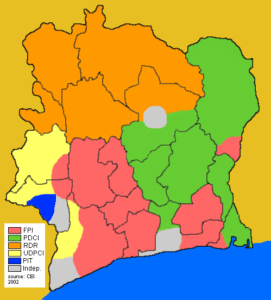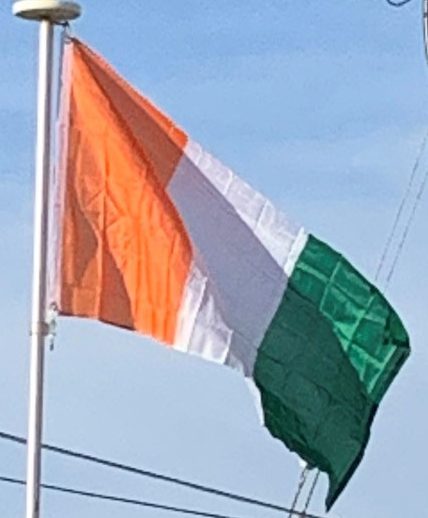
This sparked violent protests in which his supporters, mainly from the country’s north, battled riot police in the capital, Yamoussoukro.
Ivorian Civil War:
In the early hours of 19 September 2002, while the President was in Italy, an armed uprising occurred. Troops who were to be demobilised mutinied, launching attacks in several cities. The battle for the main gendarmerie barracks in Abidjan lasted until mid-morning, but by lunchtime, the government forces had secured Abidjan. They had lost control of the north of the country, and rebel forces made their stronghold in the northern city of Bouaké.

The rebels threatened to move on Abidjan again, and France deployed troops from its base in the country to stop their advance. The French said they were protecting their own citizens from danger, but their deployment also helped government forces. That the French were helping either side was not established as a fact; but each side accused the French of supporting the opposite side. Whether French actions improved or worsened the situation in the long term is disputed. What exactly happened that night is also disputed. The government claimed that former president Robert Guéï led a coup attempt, and state TV showed pictures of his dead body in the street; counter-claims stated that he and 15 others had been murdered at his home, and his body had been moved to the streets to incriminate him. Alassane Ouattara took refuge in the German embassy; his home had been burned down. President Gbagbo cut short his trip to Italy and on his return stated, in a television address, that some of the rebels were hiding in the shanty towns where foreign migrant workers lived. Gendarmes and vigilantes bulldozed and burned homes by the thousands, attacking residents.
An early ceasefire with the rebels, which had the backing of much of the northern populace, proved short-lived, and fighting over the prime cocoa-growing areas resumed. France sent in troops to maintain the cease-fire boundaries, and militias, including warlords and fighters from Liberia and Sierra Leone, took advantage of the crisis to seize parts of the west.
2002 Unity Government:
In January 2003, Gbagbo and rebel leaders signed accords creating a “government of national unity”. Curfews were lifted, and French troops patrolled the western border of the country. The unity government was unstable, and central problems remained, with neither side achieving its goals. In March 2004, 120 people were killed at an opposition rally, and subsequent mob violence led to the evacuation of foreign nationals. A later report concluded the killings were planned. Though UN peacekeepers were deployed to maintain a “Zone of Confidence”, relations between Gbagbo and the opposition continued to deteriorate.
Early in November 2004, after the peace agreement had effectively collapsed because the rebels refused to disarm, Gbagbo ordered airstrikes against the rebels. During one of these airstrikes in Bouaké, on 6 November 2004, French soldiers were hit, and nine were killed; the Ivorian government said it was a mistake, but the French claimed it was deliberate. They responded by destroying most Ivoirian military aircraft (two Su-25 planes and five helicopters), and violent retaliatory riots against the French broke out in Abidjan.
